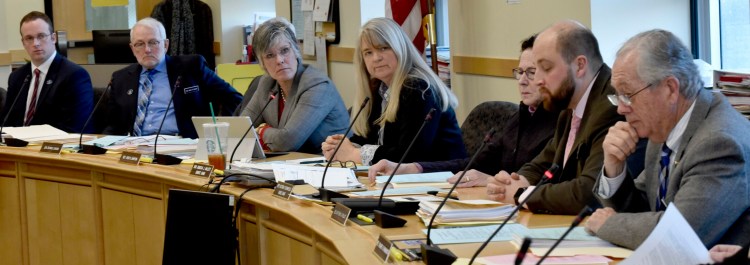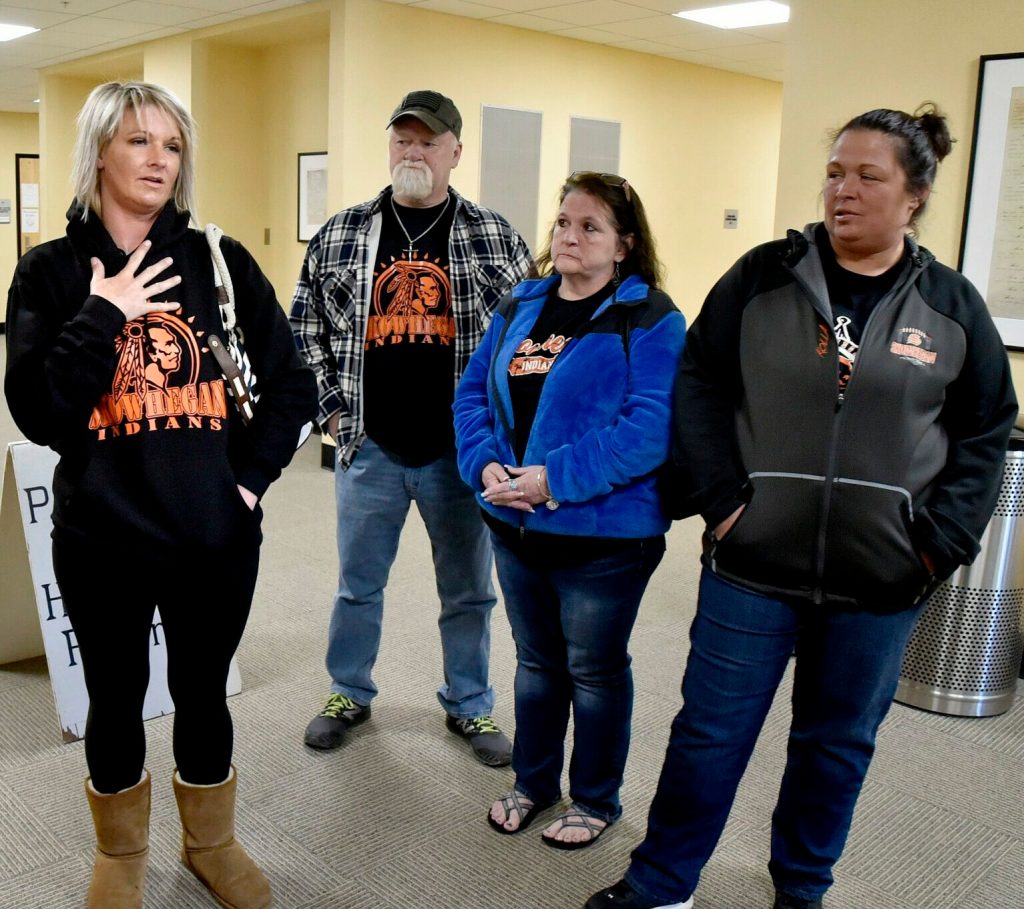AUGUSTA — A bill that would ban the use of Native American mascots in Maine’s public schools has passed the first round of legislative approval.
Members of the Committee on Education and Cultural Affairs voted 7-5 to recommend the full Legislature support the proposed legislation on Monday morning. An amendment to include post-secondary institutions that receive state funding in the ban, rather than just public K-12 institutions, was added.
It will now go before the state’s House of Representatives, which will vote on it before sending it to the Senate. A date for the House vote has not been scheduled yet.
Supporters of the Skowhegan “Indian” nickname said they are not done lobbying to keep the name.
“We’ll still email, we’ll still fight — fight to the end,” said Michelle Lewis, a resident of Skowhegan who has been active in efforts to preserve the “Indians” name. “We won’t give up. There’s a lot we still can do. It was a close vote.”
Legislators were split over the issue of local control, with all Republicans voting against the bill and all Democrats voting in favor of it.
Rep. Victoria Kornfield, D-Bangor, a co-chair of the committee, said that she views the bill as “a civil rights issue rather than local control.” Sen. Brownie Carson, D-Harpswell, agreed.
“I do see this as a civil rights issue,” he said. “It is important that we honor and respect our differences … and not create negative stereotypes or stigma or the risk that some who are different, some who are minorities, may be harmed by the mascots that we have. I think that risk is very real here. I think we heard from people who had experienced it personally.”
Rep. David McCrea, D-Fort Fairfield, said the testimony of members of the Penobscot Nation last week convinced him to vote in favor of the bill. Barry Dana, former chief of the Penobscot Nation, and Sherri Mitchell, an indigenous rights attorney and member of the Penobscot Nation, were among those who spoke for the bill last Monday.

Rep. David McCrea, D-Fort Fairfield, at right, makes a point prior to voting on a bill to ban the use of Native American mascots in public schools during a hearing in Augusta on Monday. At left is Rep. Justin Fecteau, R-Augusta. The committee voted 7-5 that the bill ought to pass. Morning Sentinel photo by David Leaming
“The most compelling thing I heard from both sides was: if someone feels that they are honoring someone and the person doesn’t feel that they are being honored … you can question it all you want… that’s the end of the story for me,” said McCrea.
Rep. Michael Brennan, D-Portland, said he felt a state-level policy is necessary.
“I think this would be a significant step forward for the state to have a unified message … that we won’t tolerate discriminatory imagery toward Native Americans,” he said.
Rep. Dick Farnsworth, D-Portland; Sen. Rebecca Millett, D-Cumberland, and Rep. Jan Dodge, D-Belfast, also voted in favor of the bill.
Opponents said that local democratic processes are sufficient for regulation and that the bill’s language was too broad. Rep. Shelley Rudnicki, R-Fairfield, the only legislator on the committee representing a Somerset County municipality, was the first to speak out against the bill on Monday. Fairfield is not a part of School Administrative District 54.

SAD 54 school board member Jennifer Poirier, a Skowhegan Pride organizer, expresses her disappointment following a vote in favor of a bill to ban the use of Native American mascots in public schools during a hearing in Augusta on Monday. Morning Sentinel photo by David Leaming
“Following through with this — to be honest, it’s going to be an expensive proposition for the school district to change everything over,” she said, echoing the concerns of SAD 54 director Jennifer Poirier, who has been a vocal opponent of the proposed change. “I just think that we need to be very cautious on the wording on this, because it is a local issue, and it is about local control. We can say it’s civil rights, but it still comes down to local control. If we continue to take local control away, we’re going down a slippery slope.”
Rep. Justin Fecteau, R-Augusta, took issue with the phrasing of banning “a Native American tribe, individual, custom or tradition and that is used as a mascot, nickname, logo, letterhead or team name of the school.” He said that under this wording, the name of Skowhegan Area High School might have to change. In the Passamaquoddy language, “Skowhegan” translates to a “brook trout fishing weir,” or large net, according to Roger Paul, who teaches the language. Other historians say the term translates to “spearing” or “place to watch.”
“I’m slightly concerned about ‘custom’ and ‘tradition,’ … because ‘Skowhegan’ could refer to a Native American custom or tradition,” said Fecteau. “This could have unintended consequences. (For instance, Skowhegan and) Nokomis might not even be able to call their high school after their town name anymore.”
Rep. Gary Drinkwater, R-Milford, said that while he thinks curricula need to be revised to include more extensive Native American studies, he ultimately could not support the bill.
“I think the way it has worked so far at the local level with a compromise and the school board taking a vote to do away with it, then (the formation of) a petition (to put it to referendum) … that’s how democracy works,” he said.
Rep. Heidi Sampson, R-Alfred, and Sen. Matthew Pouliot, R-Kennebec, were the other legislators who voted against sending the bill to the Legislature. Rep. Henry Ingwersen, D-Arundel, was not present.
Addressing concerns raised at the public hearing, the committee’s legislative analyst, Hillary Risler, said that free speech concerns did not apply because the bill concerned government regulating government and that Fourteenth Amendment concerns could be avoided if legislators added a purpose clause to the bill to explain the intent of the bill and why it is necessary. She noted that California, Oregon and Wisconsin have enacted state laws on similar issues and that Michigan, New York and South Dakota are among the states that have enacted resolutions.
After the vote, Poirier said that she thinks that if the Legislature supports the bill, the language should cover all Maine schools, including those in the Bureau of Indian Education.
“If you’re gonna follow the American Psychological Association study as a rule for this, it says any Native American mascot imagery affects all children, Native American and not,” she said. “So when they’re looking at that, I think it should include in it Indian Island schools, Passamaquoddy schools. They should be included because if you’re going to base your decision on that one study, no schools should have it, including Indian schools. So they might be biting off more than they want on this bill is how I see it.”
Since last week’s public hearing, 119 individuals have filed testimony on L.D. 944, which was presented by Rep. Benjamin Collings, D-Portland.
The bill comes on the heels of a protracted debate that has polarized constituents of School Administrative District 54 over whether or not to retire Skowhegan Area High School’s “Indian” sports nickname. The Somerset County school district is the only one left in the state that uses Native American iconography for its athletic teams.
In its most recent vote on March 7, the SAD 54 Board of Directors opted to retire the mascot, 14-9. But residents opposed to the change are insisting that the fight is not over and have been petitioning to put the issue to referendum. In 2015, the school board decided in a 11-9 vote to keep the “Indians” name. Several individuals at the public hearing last Monday voiced that they felt the proposed state law was crafted to target SAD 54. Collings maintained that he introduced the bill in December 2018, before the school board’s last vote on the topic.
Meg Robbins — 861-9239
Twitter: @megrobbins
Comments are not available on this story.
Send questions/comments to the editors.



